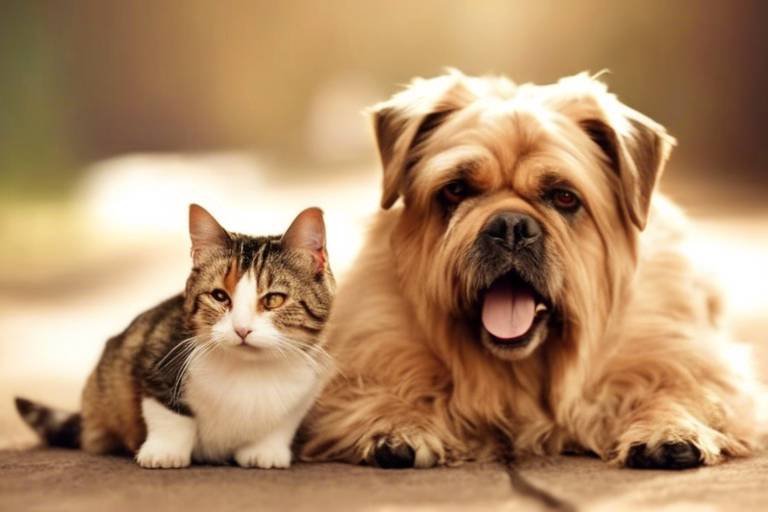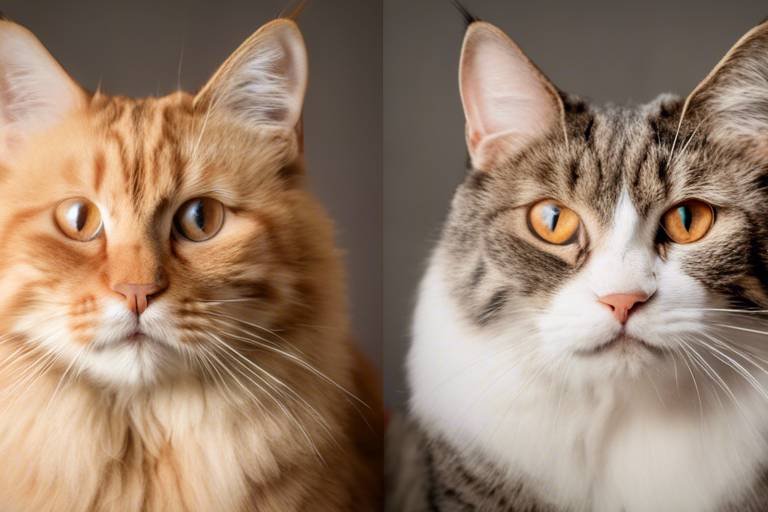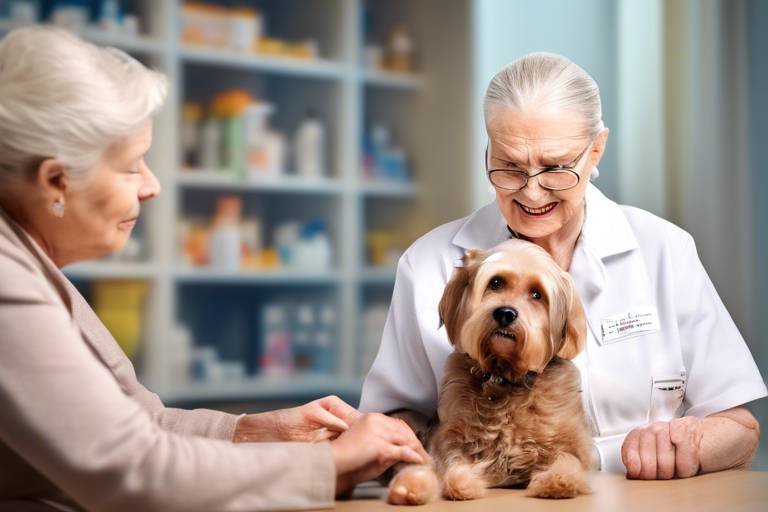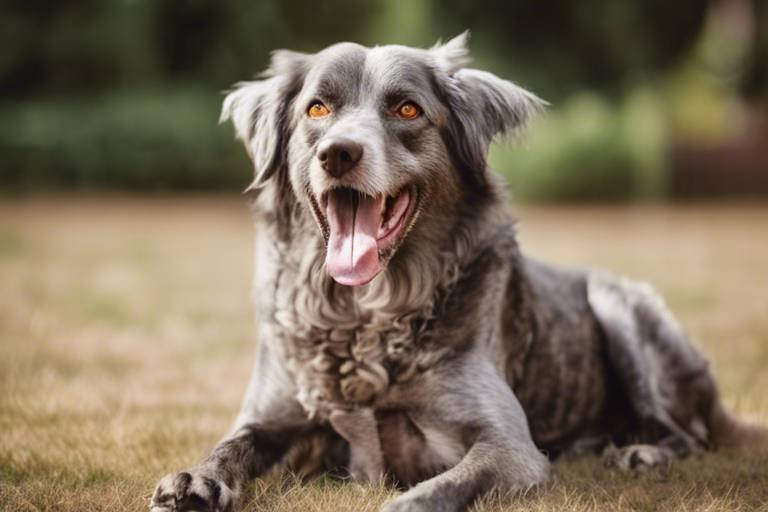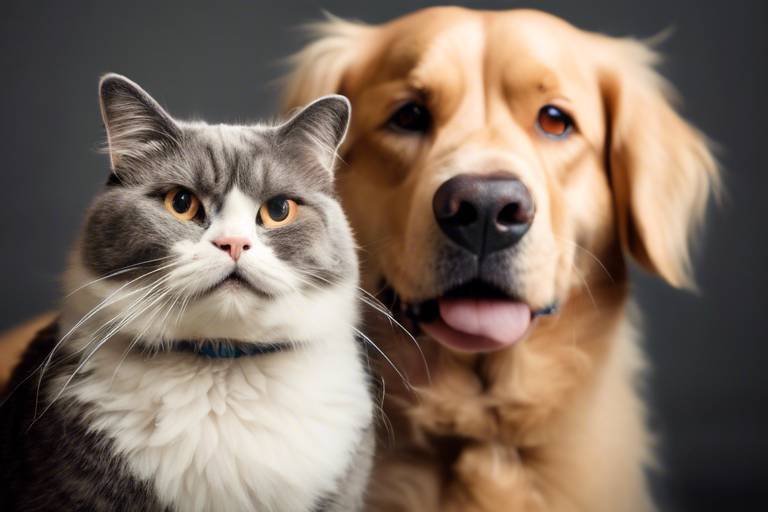Understanding Dental Care for Senior Pets
As our beloved furry friends age, their needs change, and one of the most critical aspects that often gets overlooked is dental care. Just like us, pets can suffer from various dental issues that can affect their overall health and happiness. Imagine trying to enjoy your favorite meal with a toothache; it’s no different for our pets. Dental health is not just about keeping those pearly whites shiny; it plays a vital role in their overall well-being. Poor dental hygiene can lead to serious health problems, including heart disease and infections, making regular dental care essential for our aging companions.
So, why should we prioritize dental care for senior pets? The answer is simple: prevention is always better than cure. Just as we schedule regular check-ups for our own dental health, our pets deserve the same level of attention. By understanding the common dental issues that senior pets face and taking preventive measures, we can help them lead healthier, happier lives.
Dental health is crucial for senior pets as it directly affects their overall well-being. When we think of dental care, we often focus on maintaining a bright smile, but the implications go far beyond aesthetics. Poor dental hygiene can lead to bacteria entering the bloodstream, which can cause serious health complications in vital organs like the heart and kidneys. Just think about it: a small issue in the mouth can spiral into a major health crisis if not addressed. Therefore, making dental care a priority is not just about keeping your pet's mouth clean; it's about ensuring a longer, healthier life for them.
As pets age, they become more susceptible to various dental problems. Some of the most common issues include periodontal disease, tooth decay, and even oral tumors. Recognizing these issues early can significantly improve treatment outcomes and your pet's quality of life. Just like how we might notice our own aches and pains, being observant about our pets' behaviors can help catch potential problems before they escalate.
Periodontal disease is one of the most prevalent dental issues in senior pets. It occurs when plaque builds up on teeth, leading to inflammation, gum disease, and potential tooth loss if left untreated. The buildup of plaque can create a perfect storm of bacteria that not only affects the mouth but can also lead to systemic health issues.
Common signs of periodontal disease include:
- Bad breath - If your pet has particularly foul-smelling breath, it could be a sign of dental issues.
- Swollen gums - Look for redness or swelling around the gum line.
- Difficulty eating - If your pet is hesitant to chew or shows signs of discomfort while eating, it’s time to take action.
Pet owners should monitor their pets for these symptoms to seek veterinary care promptly. Catching these signs early can make a world of difference in treatment options and outcomes.
Treatment for periodontal disease often involves professional dental cleaning, tooth extractions, and at-home care routines to maintain oral health. Early intervention is key to preventing further complications. Regular dental check-ups can help keep your pet's mouth healthy and avoid the need for more invasive procedures down the line.
Tooth decay can affect senior pets as well, leading to pain and discomfort. Regular dental check-ups can help identify and address decay before it progresses to more severe issues. Just like how we might get a cavity filled, our pets can benefit from similar treatments to ensure they remain pain-free.
Preventive care is vital for maintaining dental health in senior pets. Regular brushing, dental chews, and professional cleanings can significantly reduce the risk of dental diseases. Think of it as a routine that can save you and your pet from a world of hurt in the future.
Brushing your pet’s teeth regularly is one of the most effective ways to prevent dental problems. Use pet-safe toothpaste and introduce brushing gradually to make it a positive experience. It might take some time for your pet to get used to it, but the long-term benefits are worth the effort.
Dental chews and toys can help reduce plaque and tartar buildup while keeping your senior pet entertained. Choose products specifically designed for dental health to maximize benefits. It's a win-win situation where your pet gets to have fun while also taking care of their teeth!
Pet owners should be vigilant for signs that indicate a need for dental check-ups, such as changes in eating habits, excessive drooling, or noticeable discomfort when chewing. Being proactive can save your pet from unnecessary pain and suffering.
If your senior pet exhibits changes in behavior, such as reluctance to eat or play, it may indicate dental pain. Observing these changes can prompt timely veterinary visits. Remember, our pets can’t tell us when they’re in pain, so we need to be their advocates.
Regular veterinary check-ups are essential for monitoring your pet's dental health. Your veterinarian can provide professional cleanings and advice tailored to your senior pet's specific needs. These visits can be crucial in catching dental issues before they become serious problems.
1. How often should I brush my pet's teeth?
It's recommended to brush your pet's teeth at least two to three times a week, but daily brushing is ideal for optimal dental health.
2. What are the signs of dental pain in pets?
Signs can include changes in eating habits, excessive drooling, bad breath, and reluctance to play or engage in activities.
3. Can dental issues affect my pet’s overall health?
Absolutely! Poor dental health can lead to serious systemic issues, including heart disease and infections, so maintaining oral hygiene is crucial.
4. Are dental chews effective?
Yes! Dental chews can help reduce plaque and tartar buildup while providing your pet with a tasty treat.

The Importance of Dental Care
Dental health is crucial for senior pets as it directly affects their overall well-being. Just like in humans, maintaining good oral hygiene in pets can prevent a plethora of health issues. Imagine your furry friend feeling vibrant and energetic, all because you took the time to care for their teeth! Poor dental hygiene can lead to serious health complications, including heart disease, kidney problems, and infections that can spread throughout the body. Therefore, regular dental care is not just a luxury; it’s a necessity.
As pets age, their bodies undergo various changes, and their dental health is no exception. Many pet owners might think, "My pet is just getting older; it's natural for them to have some dental issues." However, it’s essential to understand that many dental problems are preventable! By taking proactive measures, you can ensure that your senior pet enjoys a happy and healthy life.
Regular dental check-ups and at-home care can significantly reduce the risk of developing severe dental diseases. For instance, plaque and tartar buildup can lead to periodontal disease, which is not only painful for your pet but can also result in tooth loss if left untreated. The connection between oral health and overall health is profound; for example, bacteria from periodontal disease can enter the bloodstream, affecting the heart and other vital organs. This is why monitoring your pet's dental health is so important!
Incorporating dental care into your pet's routine can be as simple as brushing their teeth a few times a week or providing dental treats designed to promote oral hygiene. Think of it as a team effort between you and your pet. The more you invest in their dental care now, the more you'll save on potential health issues down the road. So, let’s make dental health a priority and keep those tails wagging!

Common Dental Issues in Senior Pets
This article explores the importance of dental care for senior pets, highlighting common dental issues, preventive measures, treatment options, and tips for maintaining oral health in aging animals.
Dental health is crucial for senior pets as it directly affects their overall well-being. Poor dental hygiene can lead to serious health issues, including heart disease and infections, making regular dental care essential.
As our beloved furry companions age, their dental health can significantly decline, leading to various issues that can affect their quality of life. Common dental problems in senior pets include periodontal disease, tooth decay, and even oral tumors. Recognizing these issues early is vital, as it can help ensure timely treatment and better health outcomes. Let's delve deeper into these common dental issues.
Periodontal disease is one of the most prevalent dental issues in senior pets. It occurs when plaque builds up on teeth, leading to inflammation, gum disease, and potential tooth loss if left untreated. This condition not only causes discomfort but can also lead to more severe health complications if bacteria enter the bloodstream.
Pet owners should be aware of the common signs of periodontal disease, which include:
- Bad breath
- Swollen or bleeding gums
- Difficulty eating or chewing
- Excessive drooling
If you notice any of these symptoms, it’s crucial to seek veterinary care promptly to prevent further complications.
Treatment for periodontal disease often involves professional dental cleaning, which removes plaque and tartar buildup. In more severe cases, tooth extractions may be necessary to alleviate pain and prevent infection. Additionally, establishing at-home care routines, such as regular brushing and using dental chews, can help maintain oral health. Early intervention is key to preventing further complications and ensuring your pet remains comfortable.
Tooth decay can also affect senior pets, leading to pain and discomfort. Just like in humans, this condition can develop due to poor dental hygiene and can severely impact your pet's ability to eat and enjoy life. Regular dental check-ups can help identify and address decay before it progresses to more severe issues.
Preventive care is vital for maintaining dental health in senior pets. Regular brushing, dental chews, and professional cleanings can significantly reduce the risk of dental diseases.
Brushing your pet’s teeth regularly is one of the most effective ways to prevent dental problems. Use pet-safe toothpaste and introduce brushing gradually to make it a positive experience.
Dental chews and toys can help reduce plaque and tartar buildup while keeping your senior pet entertained. Choose products specifically designed for dental health to maximize benefits.
Pet owners should be vigilant for signs that indicate a need for dental check-ups, such as changes in eating habits, excessive drooling, or noticeable discomfort when chewing.
If your senior pet exhibits changes in behavior, such as reluctance to eat or play, it may indicate dental pain. Observing these changes can prompt timely veterinary visits.
Regular veterinary check-ups are essential for monitoring your pet's dental health. Your veterinarian can provide professional cleanings and advice tailored to your senior pet's specific needs.
Q: How often should I brush my senior pet's teeth?
A: Ideally, you should brush your pet's teeth at least two to three times a week. However, daily brushing is the best way to maintain oral health.
Q: What are the signs that my pet may need a dental cleaning?
A: Look for signs such as bad breath, swollen gums, changes in eating habits, or difficulty chewing. If you notice these symptoms, it’s best to consult your veterinarian.
Q: Are dental chews effective for preventing dental issues?
A: Yes! Dental chews can help reduce plaque and tartar buildup, but they should be used in conjunction with regular brushing and veterinary check-ups for optimal dental health.
Periodontal Disease
Periodontal disease is a significant concern for senior pets, and understanding it is crucial for any pet owner. This condition arises from the accumulation of plaque and tartar on the teeth, which can lead to inflammation of the gums, known as gingivitis. If left unchecked, this inflammation can progress to periodontitis, a more severe form of gum disease that can result in tooth loss and even affect your pet's overall health.
One of the most alarming aspects of periodontal disease is its potential to cause systemic health issues. The bacteria from infected gums can enter the bloodstream, leading to serious complications such as heart disease, kidney problems, and even liver damage. This makes it imperative for pet owners to be vigilant about their pets' dental health as they age.
Recognizing the signs of periodontal disease early can make a world of difference. Here are some common indicators to watch for:
- Bad breath: While some pet odors are normal, an overpowering smell can indicate dental issues.
- Swollen or bleeding gums: If you notice redness or swelling, it's time to consult a veterinarian.
- Difficulty eating: If your pet is struggling to chew or seems to favor one side of their mouth, it may be due to dental pain.
Taking a proactive approach can help mitigate the risks associated with periodontal disease. Regular dental check-ups, professional cleanings, and at-home care routines are essential in keeping your pet's mouth healthy. It's important to note that once periodontal disease sets in, it can require more extensive treatment, including tooth extractions in severe cases. Therefore, maintaining your pet's dental hygiene should be a priority.
In summary, periodontal disease is not just a cosmetic issue; it can have far-reaching implications for your senior pet's health. By staying informed and attentive to your pet's dental needs, you can help ensure they lead a happy and healthy life well into their golden years.
Q: How often should I brush my pet's teeth?
A: Ideally, you should brush your pet's teeth daily, but even a few times a week can make a significant difference in their dental health.
Q: Are dental chews effective?
A: Yes! Dental chews can help reduce plaque and tartar buildup while also providing a tasty treat for your pet.
Q: When should I take my pet for a dental check-up?
A: If you notice any signs of dental issues, such as bad breath or difficulty eating, or if it's been over six months since their last check-up, it's time to visit the vet.
Signs of Periodontal Disease
Periodontal disease is a sneaky adversary that can creep up on our beloved senior pets, often without any obvious signs until it becomes quite severe. As a pet owner, it’s crucial to stay vigilant and recognize the subtle yet telling signs that your furry friend might be suffering from this common dental issue. One of the first indicators is bad breath, or halitosis, which is often a result of the bacteria that thrive in plaque and tartar buildup. If your pet’s breath smells less than fresh, it could be time for a dental check-up.
In addition to bad breath, swollen or bleeding gums are major red flags. When you gently lift your pet's lips, take note of any inflammation or discoloration around the gums. Healthy gums should be a nice pink color, not red or swollen. If you notice any bleeding when your pet eats or when you brush their teeth, it’s a sign that the periodontal disease may be progressing.
Another sign to watch for is difficulty eating. If your pet is suddenly hesitant to chew their food or seems to be favoring one side of their mouth, it could indicate pain or discomfort caused by dental issues. This change in eating habits can lead to further health complications, so it's essential to address it promptly. Additionally, keep an eye out for excessive drooling or any unusual oral behavior, like pawing at their mouth or reluctance to play with their favorite toys.
To summarize, here are the key signs of periodontal disease to monitor:
- Bad breath
- Swollen or bleeding gums
- Difficulty eating or chewing
- Excessive drooling
- Changes in behavior, like reluctance to play
Recognizing these signs early on can make a world of difference. If you notice any of these symptoms, don’t hesitate to consult your veterinarian for a thorough dental examination. Keeping your senior pet’s teeth and gums healthy is not just about a pretty smile; it’s about ensuring their overall health and happiness.
Q: How often should I have my senior pet's teeth checked?
A: It's recommended to have a professional dental check-up at least once a year, but your veterinarian may suggest more frequent visits based on your pet's specific needs.
Q: Can I brush my senior pet's teeth?
A: Absolutely! Regular brushing is one of the best ways to maintain dental health. Use pet-safe toothpaste and introduce the process gradually to make it a positive experience for your pet.
Q: What are some dental care products I can use?
A: Look for dental chews, toys, and water additives specifically designed for pets. These products can help reduce plaque and tartar buildup while keeping your pet entertained.
Q: Are there any signs that indicate my pet needs immediate dental care?
A: Yes! If you notice severe bad breath, bleeding gums, or if your pet is in obvious pain while eating, you should seek veterinary care right away.
Treatment Options
When it comes to addressing periodontal disease in senior pets, a range of are available, tailored to the severity of the condition and the individual needs of your furry friend. The first step often involves a thorough professional dental cleaning performed by a veterinarian. This procedure not only removes plaque and tartar that have built up over time but also allows for a detailed examination of your pet's oral health. During this cleaning, the veterinarian may also take X-rays to check for any underlying issues that aren’t visible to the naked eye.
If the periodontal disease is advanced, tooth extractions may be necessary. While the idea of removing teeth can be concerning, it’s important to understand that keeping decayed or infected teeth can lead to more serious health problems, including pain and systemic infections. Your veterinarian will discuss the best course of action, ensuring that your pet's comfort and health are prioritized.
In addition to these professional treatments, at-home care plays a crucial role in maintaining your pet's oral health post-treatment. Here are some key components of an effective at-home dental care routine:
- Regular Brushing: Aim to brush your pet's teeth at least two to three times a week. Use toothpaste specifically formulated for pets, as human toothpaste can be harmful to them.
- Dental Rinses: These can help reduce plaque buildup and freshen breath. Consult your veterinarian for recommendations on safe products.
- Dietary Considerations: Some pet foods are designed to promote dental health. Discuss with your vet whether a specialized diet might be beneficial for your senior pet.
Moreover, keeping an eye on your pet’s behavior and oral health is essential. If you notice any changes, such as reluctance to eat or signs of discomfort, it’s vital to consult your veterinarian promptly. Remember, early intervention can make a significant difference in treatment outcomes and your pet’s overall quality of life.
Tooth Decay
Tooth decay is not just a human problem; our furry companions can suffer from it too, especially as they age. Just like us, senior pets experience changes in their dental health that can lead to painful and uncomfortable situations. Imagine biting into a crunchy treat and feeling a sharp pain instead—this is the reality for many senior pets with untreated tooth decay. This condition occurs when bacteria in the mouth produce acids that erode the tooth enamel, leading to cavities and, ultimately, severe dental issues if not addressed promptly.
One of the most alarming aspects of tooth decay in senior pets is that it often goes unnoticed until it reaches an advanced stage. Many pet owners may not realize that their beloved companions are suffering silently. Regular veterinary visits are crucial; they can help detect signs of tooth decay early on. Some common indicators include:
- Painful chewing: If your pet hesitates or avoids chewing their food, it may be a sign of dental pain.
- Behavior changes: Increased irritability or withdrawal from play can signal discomfort.
- Bad breath: While some pet odors are normal, a sudden change to a foul smell can indicate decay.
Tooth decay can lead to more serious health issues beyond just dental pain. Bacteria from decayed teeth can enter the bloodstream, potentially affecting vital organs like the heart and kidneys. This connection between oral health and overall well-being emphasizes the importance of preventive care. Regular dental check-ups and cleanings can help manage and prevent tooth decay, ensuring your pet maintains a healthy mouth and a happy life.
In addition to professional dental care, pet owners can take proactive steps at home to help prevent tooth decay. Here are some effective strategies:
- Regular brushing: Just like humans, pets benefit from regular tooth brushing. Use a soft-bristled toothbrush and pet-safe toothpaste to make the process enjoyable.
- Dental treats: Specially formulated dental treats can help reduce plaque buildup and keep your pet's teeth cleaner.
- Routine check-ups: Schedule regular veterinary visits to monitor your pet’s dental health and catch any issues early.
In conclusion, tooth decay is a significant concern for senior pets, but it is manageable with the right care and attention. By recognizing the signs and taking preventive measures, you can help your furry friend maintain a healthy and pain-free mouth. Remember, a happy pet is a healthy pet!
Q: How often should I brush my pet's teeth?
A: Ideally, you should brush your pet's teeth daily. However, even brushing a few times a week can make a significant difference in their dental health.
Q: What are the signs that my pet may have tooth decay?
A: Look for signs such as bad breath, difficulty eating, changes in behavior, and excessive drooling. If you notice any of these symptoms, consult your veterinarian.
Q: Can tooth decay be reversed?
A: Unfortunately, once tooth decay has progressed, it cannot be reversed. However, early intervention can prevent further damage and manage the condition effectively.
Q: Are there specific dental products I should use?
A: Yes, always use pet-safe toothpaste and dental products designed specifically for pets. Avoid human toothpaste, as it can be harmful to them.

Preventive Measures for Dental Health
When it comes to keeping our senior pets happy and healthy, preventive care plays a crucial role, especially in maintaining their dental health. Just like humans, pets can suffer from a myriad of dental issues if their teeth and gums are neglected. Fortunately, there are several effective measures that pet owners can take to ensure their furry friends enjoy a lifetime of healthy smiles. Regular dental care not only improves your pet's oral hygiene but also contributes to their overall well-being.
One of the most effective preventive measures is brushing your pet’s teeth. This might sound daunting, but with the right approach, it can become a positive experience for both you and your pet. Start by introducing your pet to the toothbrush gradually. Use a pet-safe toothpaste (never use human toothpaste, as it can be harmful) and make brushing a part of your daily routine. Aim for at least two to three times a week. Remember, consistency is key!
In addition to brushing, incorporating dental chews and toys into your pet's daily life can significantly enhance their oral hygiene. These products are designed to help reduce plaque and tartar buildup while providing entertainment. Look for dental chews that are specifically formulated for dental health; they often contain ingredients that promote fresh breath and healthy gums. Just like how we enjoy a good snack, our pets also love to chew, so why not make it beneficial?
Another essential preventive measure is scheduling regular veterinary check-ups. These visits allow your veterinarian to perform professional cleanings and assess your pet's dental health. During these check-ups, your vet can identify potential issues before they escalate into serious problems. It’s also a great opportunity to ask questions about your pet’s specific dental needs and receive tailored advice.
To give you a clearer picture of how to maintain your senior pet's dental health, here’s a simple table summarizing the key preventive measures:
| Preventive Measure | Description |
|---|---|
| Brushing Teeth | Use pet-safe toothpaste and brush regularly to prevent plaque buildup. |
| Dental Chews | Provide dental chews and toys designed to reduce plaque and tartar. |
| Regular Vet Visits | Schedule check-ups for professional cleanings and dental assessments. |
Implementing these preventive measures can make a significant difference in your senior pet's dental health. It’s all about creating a routine that works for both you and your pet. Remember, a little effort today can lead to a lifetime of smiles and comfort for your furry friend!
- How often should I brush my pet's teeth? It’s recommended to brush your pet's teeth at least two to three times a week for optimal dental health.
- Are dental chews safe for my pet? Yes, as long as they are specifically designed for pets and made with safe ingredients. Always supervise your pet while they chew.
- What signs indicate that my pet needs a dental check-up? Watch for bad breath, difficulty eating, swollen gums, or changes in behavior, which may suggest dental issues.
Brushing Your Pet’s Teeth
Brushing your pet’s teeth might seem like a daunting task, but it’s one of the most effective ways to maintain their dental health. Just like humans, our furry companions are susceptible to plaque and tartar buildup, which can lead to painful dental issues if not addressed. So, why not make tooth brushing a part of your pet care routine? It’s easier than you might think!
To start off, it’s important to use pet-safe toothpaste. Human toothpaste contains ingredients that can be harmful to pets, so always opt for a formula specifically designed for animals. You can find these at your local pet store or online. When introducing the toothpaste, let your pet lick a small amount off your finger to get them accustomed to the taste. This step is crucial because it helps create a positive association with the brushing process.
Next, gradually introduce the toothbrush. You can use a soft-bristled toothbrush designed for pets or even a finger brush. Start by gently brushing just a few teeth at a time. Focus on the outer surfaces where plaque tends to accumulate. As your pet becomes more comfortable, you can work your way around their mouth. Remember to be patient; it might take a few sessions before your pet fully embraces this new routine!
Here’s a quick breakdown of the steps to follow:
- Choose a quiet time when your pet is calm.
- Apply a small amount of pet-safe toothpaste to the brush.
- Gently lift your pet’s lip to expose their teeth.
- Brush in a circular motion, focusing on the gum line.
- Reward your pet with praise or a treat afterward!
Consistency is key! Aim to brush your pet’s teeth at least two to three times a week, if not daily. If daily brushing feels overwhelming, just do your best. Even a few times a week can make a significant difference in your pet’s oral health. Additionally, consider pairing brushing with other dental care products like dental chews or water additives to further enhance their oral hygiene.
Lastly, don’t forget to monitor your pet’s response. If they seem uncomfortable or resistant, take a step back and try again later. The goal is to make this a positive experience for both you and your pet. Over time, brushing their teeth can become a bonding activity, reinforcing your connection with your furry friend while keeping their smile bright and healthy!
Q: How often should I brush my pet’s teeth?
A: Ideally, you should brush your pet’s teeth daily, but a few times a week can also be beneficial.
Q: What if my pet doesn’t like having their teeth brushed?
A: Start slowly and make it a positive experience with treats and praise. You can also consult your veterinarian for tips on easing your pet into the routine.
Q: Are there alternatives to brushing?
A: Yes! Dental chews, water additives, and dental toys can help maintain your pet’s oral health in conjunction with brushing.
Q: Can dental problems affect my pet's overall health?
A: Absolutely! Poor dental health can lead to serious health issues, including heart disease and infections, so maintaining good oral hygiene is crucial.
Dental Chews and Toys
Dental chews and toys are not just fun playthings for your senior pets; they serve a crucial role in maintaining their oral health. Just like humans, pets can benefit from products designed to help clean their teeth and gums. The action of chewing can naturally reduce plaque and tartar buildup, making it an enjoyable way for your furry friend to keep their mouth healthy. Imagine a dog gnawing on a chew toy, not only enjoying the taste but also working to prevent dental issues at the same time! How cool is that?
When selecting dental chews and toys, it's important to choose those specifically designed for dental health. Look for products that have the Veterinary Oral Health Council (VOHC) seal of approval. These products have been tested for their effectiveness in reducing plaque and tartar. Here are some types of dental chews and toys you might consider:
- Rawhide Chews: These can be effective in reducing plaque when chewed properly, but be cautious as they can pose choking hazards if pieces break off.
- Rubber Toys: Durable rubber toys can withstand heavy chewing and often have nubs or ridges that help clean teeth.
- Dental Treats: Many brands offer tasty treats that are formulated to promote oral health while satisfying your pet's taste buds.
Incorporating these chews and toys into your pet's daily routine can be a game-changer. Not only do they help with dental hygiene, but they also provide mental stimulation and physical exercise, which are equally important as your pet ages. Just remember, while dental chews and toys are beneficial, they should not replace regular brushing and professional dental cleanings. Think of them as part of a comprehensive dental care plan for your beloved companion!
Q: How often should I give my pet dental chews?
A: It’s generally safe to offer dental chews daily, but always follow the manufacturer's guidelines and consult with your veterinarian for personalized advice.
Q: Can dental toys replace brushing my pet's teeth?
A: While dental toys help reduce plaque, they should complement brushing, not replace it. Regular brushing is crucial for optimal dental health.
Q: What signs indicate that a dental chew or toy is no longer safe?
A: If the chew or toy becomes too small, breaks into sharp pieces, or shows excessive wear, it’s time to replace it to avoid choking hazards.

Signs Your Pet Needs a Dental Check-Up
As a loving pet owner, it’s essential to stay vigilant about your furry friend’s health, especially when it comes to their dental well-being. You might be wondering, "How can I tell if my senior pet needs a dental check-up?" Well, there are several signs that can serve as red flags, indicating that it’s time to schedule a visit to the veterinarian. First and foremost, changes in eating habits can be a significant indicator. If your pet suddenly becomes picky about their food or seems to struggle while chewing, it’s crucial to investigate further. This could be a sign of dental pain or discomfort that warrants professional attention.
Another common sign is excessive drooling. While some drooling can be normal, an increase in saliva production can indicate oral issues, such as infections or inflamed gums. Pay close attention to your pet’s mouth; if you notice any unusual odors, it could point to a problem as well. Bad breath, medically known as halitosis, is often a telltale sign of underlying dental disease. If your pet’s breath smells foul, it’s time to take action!
Additionally, be on the lookout for any signs of discomfort or pain. If your pet seems hesitant to chew their favorite toys or treats, or if they exhibit signs of distress while eating, this could indicate dental problems. Furthermore, observe their behavior closely; changes such as increased irritability or withdrawal from playtime can sometimes correlate with dental issues. In fact, many pets may try to hide their pain, so being attentive to these subtle shifts in behavior is vital.
To help you keep track of these signs, here’s a quick summary:
- Changes in eating habits: Reluctance to eat or difficulty chewing.
- Excessive drooling: Noticeable increase in saliva production.
- Bad breath: Unpleasant odor emanating from the mouth.
- Discomfort while eating: Signs of pain when chewing or reluctance to eat.
- Behavioral changes: Increased irritability or withdrawal from activities.
Regular veterinary visits are essential for monitoring your senior pet’s dental health. During these check-ups, your veterinarian can perform professional cleanings and provide tailored advice specific to your pet’s needs. Remember, early intervention can make a world of difference in preventing more severe health issues down the line.
Q: How often should I take my senior pet for dental check-ups?
A: It’s generally recommended to have your senior pet’s teeth checked at least once a year, but your veterinarian may suggest more frequent visits if dental issues are present.
Q: Can I brush my pet’s teeth at home?
A: Absolutely! Brushing your pet’s teeth at home is one of the best ways to maintain their dental health. Just be sure to use toothpaste specifically designed for pets.
Q: What are some signs of dental pain in pets?
A: Signs of dental pain may include reluctance to eat, excessive drooling, bad breath, and behavioral changes such as irritability or withdrawal.
Q: Are dental chews effective for maintaining oral health?
A: Yes! Dental chews can help reduce plaque and tartar buildup. Just be sure to choose products specifically designed for dental health.
Changes in Behavior
This article explores the importance of dental care for senior pets, highlighting common dental issues, preventive measures, treatment options, and tips for maintaining oral health in aging animals.
Dental health is crucial for senior pets as it directly affects their overall well-being. Poor dental hygiene can lead to serious health issues, including heart disease and infections, making regular dental care essential.
As pets age, they are prone to various dental problems, such as periodontal disease, tooth decay, and oral tumors. Recognizing these issues early can help ensure timely treatment and better health outcomes.
Periodontal disease is one of the most prevalent dental issues in senior pets. It occurs when plaque builds up on teeth, leading to inflammation, gum disease, and potential tooth loss if left untreated.
Common signs of periodontal disease include bad breath, swollen gums, and difficulty eating. Pet owners should monitor their pets for these symptoms to seek veterinary care promptly.
Treatment for periodontal disease often involves professional dental cleaning, tooth extractions, and at-home care routines to maintain oral health. Early intervention is key to preventing further complications.
Tooth decay can affect senior pets, leading to pain and discomfort. Regular dental check-ups can help identify and address decay before it progresses to more severe issues.
Preventive care is vital for maintaining dental health in senior pets. Regular brushing, dental chews, and professional cleanings can significantly reduce the risk of dental diseases.
Brushing your pet’s teeth regularly is one of the most effective ways to prevent dental problems. Use pet-safe toothpaste and introduce brushing gradually to make it a positive experience.
Dental chews and toys can help reduce plaque and tartar buildup while keeping your senior pet entertained. Choose products specifically designed for dental health to maximize benefits.
Pet owners should be vigilant for signs that indicate a need for dental check-ups, such as changes in eating habits, excessive drooling, or noticeable discomfort when chewing.
Changes in behavior can be one of the most telling signs that your senior pet may be experiencing dental issues. If your furry friend starts to show reluctance to eat or seems less enthusiastic about their favorite activities, it could indicate that they are dealing with some discomfort or pain. For instance, you might notice them turning away from their food bowl or chewing more cautiously than usual. These subtle signs can often be overlooked, but they are crucial indicators of underlying dental problems.
Additionally, if your pet begins to display excessive drooling or has difficulty picking up their toys, it might be time to pay a visit to the veterinarian. Changes in behavior can include:
- Loss of Appetite: If your pet suddenly loses interest in food, it could be due to dental pain.
- Increased Irritability: Pets in pain may become more irritable or withdrawn.
- Changes in Grooming Habits: A decrease in grooming might signal discomfort, as pets may avoid using their mouths.
Understanding these behavioral changes is essential for pet owners. By being observant and proactive, you can ensure that your senior pet receives the necessary care and treatment before their dental issues escalate.
Regular veterinary check-ups are essential for monitoring your pet's dental health. Your veterinarian can provide professional cleanings and advice tailored to your senior pet's specific needs.
Q: How often should I brush my senior pet's teeth?
A: Ideally, you should brush your senior pet's teeth at least 2-3 times a week, but daily brushing is even better for optimal dental health.
Q: What are the signs that my pet needs dental care?
A: Look for signs such as bad breath, swollen gums, difficulty eating, and changes in behavior like irritability or reluctance to play.
Q: Can dental issues affect my pet's overall health?
A: Yes, poor dental health can lead to serious health problems, including heart disease and infections, making dental care vital for overall well-being.
Q: Are there special diets for senior pets to help their dental health?
A: Yes, some pet foods are specifically formulated to promote dental health, helping to reduce plaque and tartar buildup.
Regular Veterinary Visits
When it comes to the health of your senior pet, are absolutely essential. Think of your veterinarian as your pet's best friend in the realm of health care. These visits are not just about vaccinations; they’re a comprehensive approach to keeping your furry companion in top shape. Regular check-ups allow for early detection of potential dental issues that may not be immediately visible to you. Just like humans, pets can have underlying problems that require professional attention, and early intervention can make a world of difference.
During these veterinary visits, your veterinarian will perform a thorough examination of your pet's mouth and teeth. This includes checking for signs of periodontal disease, tooth decay, and other oral health issues. They may also recommend professional dental cleanings, which are crucial for removing plaque and tartar buildup that regular brushing might miss. You might wonder, "How often should I take my senior pet to the vet?" Generally, it’s recommended to schedule check-ups every six months, but your vet may suggest more frequent visits based on your pet's specific needs.
It's also important to keep an open line of communication with your veterinarian. Share any changes you've noticed in your pet's behavior or eating habits, as these can be telling signs of dental discomfort. For example, if your pet has suddenly become picky about their food or seems hesitant to chew, these could be indications that something is amiss. Your vet can provide tailored advice and treatment options based on your pet's unique situation.
Moreover, don't underestimate the value of preventive care. Regular visits not only help in identifying existing problems but also in preventing future issues. During these appointments, your vet can offer guidance on at-home dental care routines, recommend dental treats, and even suggest lifestyle changes that can enhance your pet's overall health. Remember, a little proactive care today can save you and your pet a lot of trouble tomorrow!
Lastly, keeping a record of your pet's dental health is a great way to track changes over time. You can create a simple table to document your pet's dental visits, treatments received, and any recommendations from your veterinarian. This can be incredibly helpful for both you and your vet, ensuring that you stay on top of your senior pet's oral health.
| Date of Visit | Veterinarian's Notes | Treatment Recommended |
|---|---|---|
| MM/DD/YYYY | Initial dental check-up, no signs of decay. | Regular brushing and dental chews. |
| MM/DD/YYYY | Signs of periodontal disease; swollen gums noted. | Professional cleaning recommended. |
Frequently Asked Questions
- Why is dental care important for senior pets?
Dental care is crucial for senior pets because poor oral hygiene can lead to serious health issues, such as heart disease and infections. Maintaining good dental health directly impacts their overall well-being.
- What are the common dental issues in senior pets?
Senior pets often face dental problems like periodontal disease, tooth decay, and oral tumors. Recognizing these issues early can help ensure timely treatment and better health outcomes.
- How can I tell if my pet has periodontal disease?
Signs of periodontal disease include bad breath, swollen gums, and difficulty eating. If you notice these symptoms, it's important to seek veterinary care promptly to prevent further complications.
- What treatment options are available for dental issues?
Treatment for dental problems often involves professional dental cleaning, tooth extractions, and at-home care routines. Early intervention is key to preventing more severe issues.
- How often should I brush my pet’s teeth?
Ideally, you should brush your pet's teeth daily. Regular brushing helps prevent plaque buildup and dental diseases, making it a vital part of your pet's dental care routine.
- Are dental chews effective for maintaining oral health?
Yes, dental chews can help reduce plaque and tartar buildup while keeping your senior pet entertained. Look for products specifically designed for dental health to maximize their effectiveness.
- What signs indicate my pet needs a dental check-up?
Watch for signs like changes in eating habits, excessive drooling, or noticeable discomfort when chewing. If you notice any of these changes, it may be time for a dental check-up.
- How can I make teeth brushing a positive experience for my pet?
Introduce brushing gradually and use pet-safe toothpaste. Make it a fun and rewarding experience with treats and praise to help your pet associate tooth brushing with positive outcomes.
- How often should my senior pet see the veterinarian for dental care?
Regular veterinary check-ups are essential, typically every six months to a year, depending on your pet's specific needs. Your veterinarian can provide professional cleanings and tailored advice.


